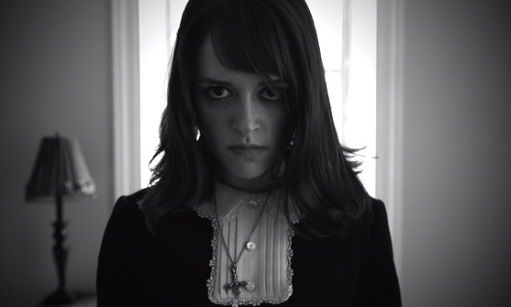 |
| "They seem naive on the outside, waif-like" - Lauren Ashley Carter |
Lauren Ashley Carter is an actress who has exhibited a nuanced onscreen presence, from the daughter in Lucky McKee’s The Woman to the self-described “toxic, bitchy asshole” Lyla in Mickey Keating’s POD. Now she is collaborating with Keating for a second time on Darling, the story of a woman who takes over caretaking duties of a large New York house. After an encounter with a friendly stranger (Brian Morvant), she spirals into madness, experiencing unsettling and nightmarish flashbacks that set the stage for this deceptively vulnerable woman to reveal a more sinister and violent nature.
Reflecting on her career thus far, Carter explained: “With the performances I have been very fortunate to pick things and to find scripts that I really love. I always try to do something that I haven't done before. It is not really a business strategy, it is more that I know that I've explored a character and those feelings thoroughly, and to go back again I just fear that I wouldn't have that freshness of doing it for the first time,or feeling that arch the same way a second time.” And here the the film is dependent on its lead actress’s often silent presence, offering Carter an opportunity to further diversify her onscreen presence.
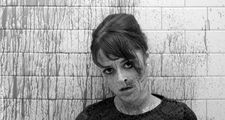 |
| "I would say they all leave a mark on me for the good or the bad." |
In conversation with Eye For Film, Carter discussed the impatient origins of the film and characters such as Darling offering a more complex and self-reflective experience for the audience. She also shared her thoughts on the evolving dynamic of working with Keating, the way dialogue and silence shapes a performance, and the transformative nature of the creative process.
Paul Risker: Picking up on your point about pursuing new characters to explore, what was the appeal of the Darling character?
Lauren Ashley Carter We had wrapped POD and no matter if it is theatre or film, you’ll get these post production blues. With the pre-production and working 12 hour days, six days a week, sometimes seven, you are working together on something for so long- it's hard. But then it's just over and you’ll sometimes have nothing. Luckily there's maybe been a couple of times in my life that I've had something immediately to jump into, but usually there's months of auditions and being back to starting over. And with theatre as well, you will have six to eight weeks Off-Broadway or regional and then you go back, and that whole life and family has just gone. So it can be very depressing.
Mickey and I were communicating a lot. He was in LA and I was in New York, and we were texting and watching movies, and we were both: Oh, we just want to make another movie… Why do we have to keep waiting! We talked about films that we would want to make and I was kvetching to him that I wanted to be the bad guy - I wanted to be the bloody one, I wanted to be the aggressor, and that I’d just never have the opportunity to do that. And I said that I was probably going to have to make my own film so that I can play that kind of role, and he was: Let's do it! I thought: Yeah sure, maybe we'll do it in a couple of years, and then he wrote a script. So the biggest thing was that I just wanted to go crazy and stab a guy a bunch of times. It sounds very simple, but that's pretty much what it was. I just wanted to absolutely lose my mind.
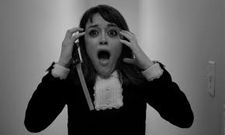 |
| "I just wanted to absolutely lose my mind." |
PR: There are a number of iconic female characters within genre cinema that Darling could be seen to relate to, one of the obvious ones being Repulsion’s Catherine Deneuve. How do you perceive the relationship of Darling to these other characters and Darling’s contribution to our experience of this?
LAC: Obviously Repulsion was a huge influence for the film, but we had a lot of other ones as well - That Cold Day In The Park was another one. They seem naive on the outside, waif-like, but then we find out with all of them that they have this very dark side. And whether or not that's because of things that have happened to them like sexual assault, abuse and neglect, it is always a question, but definitely a shadow that we do want to cast on their characters. This idea of whether someone is already distressed or whether something is not right already, for instance mental illness, and then these terrible things happen to people who are already pre-disposed to having a brain disease or disorder, what happens then. I guess the hopelessness of it all, and especially being a woman there's a vulnerability that's just inherent when you watch these films with women that they seem meek and mild.
They are usually by themselves, come from a small town or such, and I think the audience is rooting for them to make it. You want them to make it and you want to take care of them. There's that urge to take care of the meek woman of the ingenue that turns on you, and now all of a sudden this person you felt so sorry for and have been rooting for becomes evil or vicious. I think it's a fascinating look into ourselves as audience members and as people, and how we view these women. So that was the most important thing to me and not necessarily my performance and my breakdown. I didn't really think too much about that. It was mostly just trying to keep it together and trying to fight all of the demons that she’d had prior to being in this house. This was a battle that was already going on, and when she comes to the house it is the straw that breaks the camel's back I suppose.
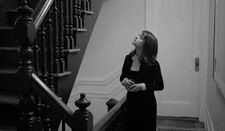 |
| "It was me walking around a house all day" |
PR: Working for a second time with Mickey Keating, did you feel that you'd begun to develop a shorthand where the collaboration was more instinctive than it was on POD?
LAC: Yes, that's definitely true and that's why I really love to work with directors and other actors repeatedly because you have that trust. You know how someone performs, you know how they are going to behave and you know their quirks and such. Mickey’s very calm and quite happy all of the time, so he's not difficult to be around and he’s a really easy guy to get along with. I saw that with POD where he always maintained composure and if you had a question he was always very nearby. We developed Darling together for a few months before we started shooting it and so we were both comfortable with the story and with each other, and we knew exactly where it needed to go.
I trust his opinion and that was really huge because sometimes you are working these 12 or 13 hour days, you are shooting out of order and you are trying your best to look back at a script and think: Okay, what was the moment that just happened before this. I know we shot it a week ago, but I have to be in that same moment because this is transitioning right out of that, and if we watch the movie and I don't have that in mind… You can tell sometimes when things don't really fit or the mood is a little bit off. So you really have to trust that your director is going to be watching for this and help you, but sometimes directors leave you and they go away because the prosthetics aren't working or something - I'm not making reference to Joe Begos and The Mind’s Eye because he's amazing. But they have a shit ton of things to do and sometimes you have to fight for your time as an actor on an indie film because of time and money. If you have any kind of technical problem, then it shouldn't happen, but sometimes the performances are the last thing on their minds. So it's nice that I feel comfortable enough with Mickey that I can come up to him and stop everything at any time to get what I need from him, and that's something you can usually only do with somebody you know well.
The shoot went smoothly. It was very short, very fast, kind of a whirlwind. We had a skeleton crew so about half way through I got a little nervous and was it working - Oh my God, what are we doing... How much time? It was me walking around a house all day and I just had a momentary panic attack and Mickey said Everything’s great. Do you feel good? I said Yes, but it's not too crazy? He was: No, no, no. I promise if I feel like something is going wrong I'll stop and let you know. [She laughs.] And we kept filming and everything was fine.
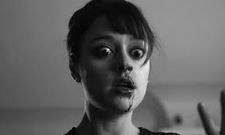 |
| "It's really nice to be able to be in this genre where nothing is too much and no one yells at me for having big eyes." |
PR: Darling places an emphasis on silent performance. As an actress, how does dialogue versus silence influence your approach?
LAC: Well, it just depends on the character and the dialogue, of course. Darling isn't one for words. If she could have it her way she wouldn't speak at all. She does it merely because she has to survive and so at this moment when she's in the bar and she's speaking with Brian Morvant’s character, it's really survival. She has to get this done and she has to do it the right way, and it's incredibly painful for her in many ways. It is painful for her talking to a man specifically, but it's also painful for her to try to be human and to try to be 'normal', because these moments are when she realises how abnormal she is, and I think it is a painful reminder for her.
The dialogue scenes that I had with her, which were very minimal, were very difficult because I just think the worst thing for her is to have to talk to a human. But with other characters it is a joy. For instance with Lyla in POD I was so excited to be this toxic, bitchy asshole... I just couldn't wait. So in those kinds of moments you just relish being able to finally talk. But yeah, it's definitely very different depending on the film. Whenever I write, I write very dialogue heavy things because I love to force my characters to interact with one another. But I love the still moments in Darling and I also love not talking because whenever I go in for television auditions I fucking ruin them. They are awful and people hate me because my facial expressions are just too much. They are constantly telling me to not open my eyes so wide – “You need to calm your face down”, but I can't. [She laughs.] For horror movies it's great because I know exactly what I am doing and what should be done. But for a cop drama I can't calm my face down and so it's really nice to be able to be in this genre where nothing is too much and no one yells at me for having big eyes.
PR: German filmmaker Christoph Behl once said to me “You are evolving, and after the film you are not the same person as you were before.” Do you perceive there to be a transformative aspect to the creative process?
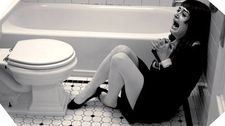 |
| "I think when you are acting in something it's even more difficult because you have to be vulnerable" |
LAC: Oh, I absolutely believe it. I don't know necessarily change, but it influences you and it leaves a mark on you. Every relationship, and that's what these are... It's not just a performance piece. It's not just me out there with teams of people that you become very close to, sometimes oddly close to for this small amount of time, and then it's over. There's also something that goes away afterwards and you'll never be able to have those moments back again, except for when you watch the film. I would say they all leave a mark on me for the good or the bad, and even though the film has turned out well there have been some really terrible things happen to me and to people I know. So I never see them as just the film or just those couple of weeks together because I put so much into them. I think when you are acting in something it's even more difficult because you have to be vulnerable… Well at least I do. I have to be vulnerable to allow myself to give the best performance I can and that doesn't stop in between takes, and it doesn't stop when I am finished for the night. And it does take a while to get my hard shell back to defend myself. So you are very sensitive to a lot of things during filming and after filming, and it's quite a difficult balance. And I don't think I've figured it out yet.
A DVD of Darling was released in the UK by Soda Pictures on October 24.





















